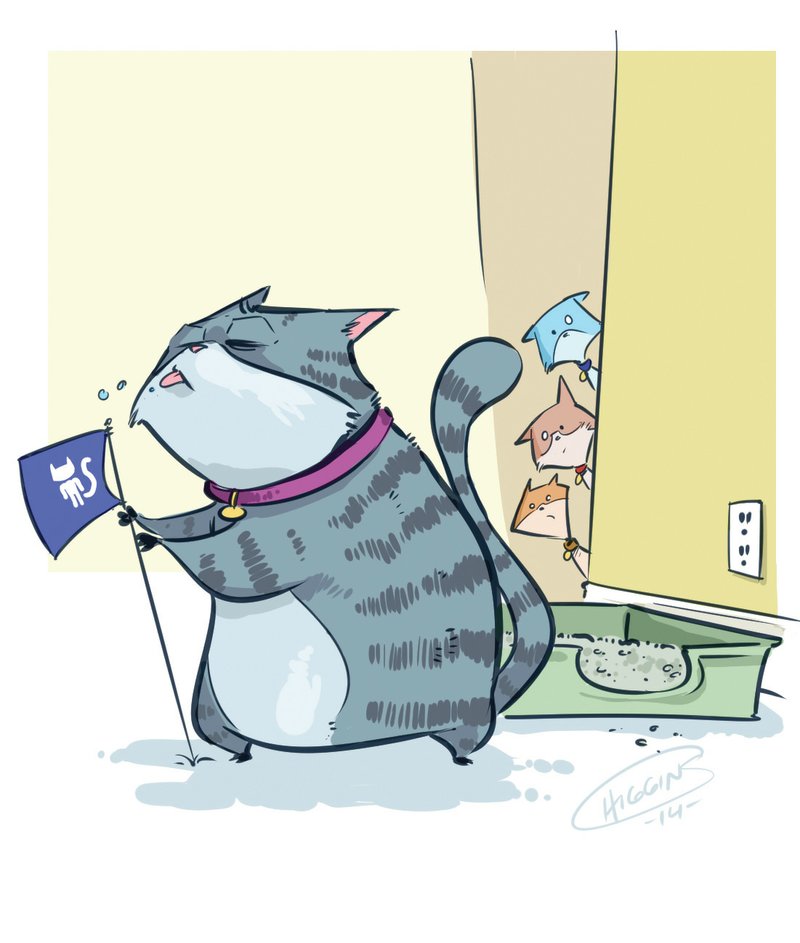We were a two-cat household, but adopted my son's two cats because of his daughter's health issues. One of the new cats is obese and weighed 23 pounds. He also started wetting in certain corners in our house. We put litter boxes where he wet; he would just wet right by them instead of in the boxes. We got different litter boxes: some with tops, some without, etc. We had a total of five boxes. We have set pet taxis near the places he wets in case his issue was stress and he wanted a quiet place. By the way, he is neutered and up to date on shots. Now our other cats have decided to wet where he wets so we have mass wettings. Our house smells like cat urine. We live in a large, two-story house with plenty of room for four cats but cannot figure out what else to do. Any suggestions?
Multi-cat households can present a multitude of challenges, not the least of which involves the litter box. As your nose knows, that's a stinker of an issue to overcome. To do so, you first have to sniff out the underlying problem.
Since the problem began with one of the new additions to your feline household, that's the place to start. You mentioned that he first began urinating in corners, so while it may appear he was looking for an out-of-the-way bathroom, he actually might have been setting his boundaries through "horizontal nonspray marking." Confident cats usually do this by backing up, lifting the tail and spraying a wall or other vertical surface, but some cats mark territory by squatting and urinating, according to feline behaviorist Pam Johnson-Bennett.
The other cats in your household responded to the first cat's behavior by eliminating in the same spot, which could be the reaction the first cat wanted all along. As Johnson-Bennett explains in her book Cat vs. Cat, horizontal nonspray marking is an uncertain cat's way of asking for information about his new housemates. He'll revisit the spraying site later to see if any of the other cats answered his communication. Then he may spray again, which in turn may prompt responses from the other cats. And so it goes until the house smells like one big litter box.
When looking for a cause, also keep in mind that persistently urinating outside the litter box is often a cry for help, Johnson-Bennett says. Take the cat to the veterinarian so that he can be tested for health issues such as diabetes, kidney failure and liver disease as well as urinary tract infections and blockages. Male cats, in particular, are prone to problems with the urethra.
Once health issues are ruled out, you can begin resolving the elimination problem, Johnson-Bennett says. First, you'll have to identify every sprayed area, which you can do using a black light. Once the areas have been noted (Johnson-Bennett suggests outlining them with painters' tape), then you'll get to work eliminating the odor and disrupting the cats' spray-based communication system.
If you're cleaning carpet, saturate the soiled areas with an enzymatic cleanser such as Nature's Miracle, Rocco & Roxie's or Anti-Icky-Poo. Whatever you buy, read the label to make sure it includes enzymes, because these neutralize odors instead of simply masking them. To use the cleanser, pour or spray it directly onto the marked areas, then leave it to do its work. Since the urine has probably penetrated the carpet padding, you may need more than one application. If the odor is persistent, then consider calling in a professional carpet cleaning service.
Here are few more tips for dealing with the odor issue:
• Place litter boxes throughout the house instead of in one area. Make sure there is at least one box per cat.
• Cover the soiled area with a plastic carpet runner and spray the plastic with Feliway, a product that contains synthetic feline facial pheromones that have a calming effect on cats. Reapply the spray twice a day.
• Set food bowls on or near the soiled areas -- cats supposedly won't soil where they eat. This is most effective when combined with the Feliway treatment.
Family on 12/10/2014
